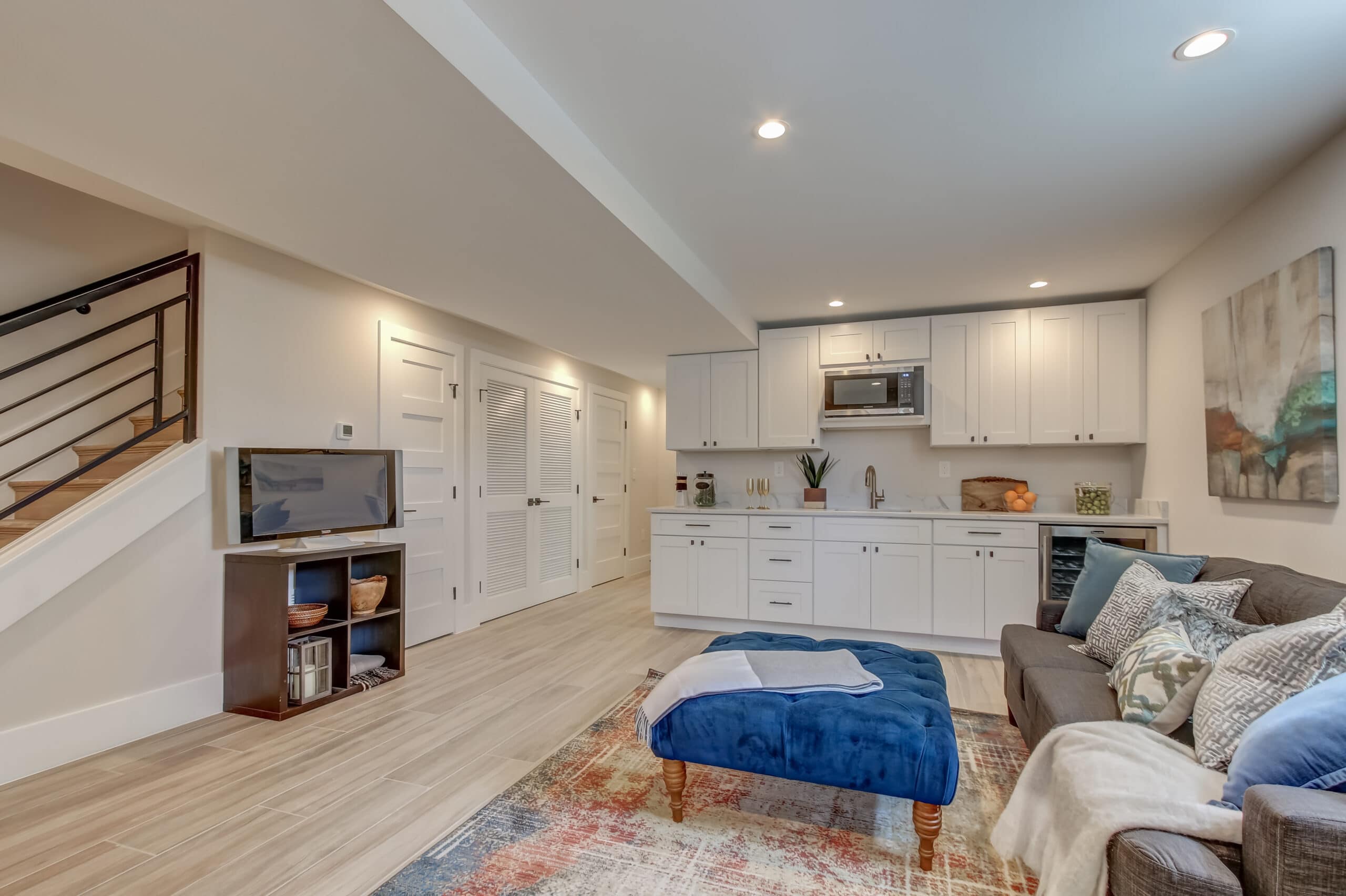Creating a Comfortable and Functional Bedroom

Transforming a basement space into a bedroom requires careful planning to ensure both comfort and functionality. A well-designed basement bedroom can be a cozy and inviting retreat, maximizing space and incorporating unique design elements to reflect your personal style.
Maximizing Space and Functionality
A key aspect of designing a basement bedroom is maximizing space. This involves creating a layout that accommodates essential furniture pieces, storage solutions, and potentially a desk or seating area.
- Comfortable Bed: The bed is the centerpiece of any bedroom, and choosing the right size is crucial. A queen-size bed is a good option for most basement bedrooms, offering ample sleeping space without overwhelming the room.
- Storage Solutions: Basement bedrooms often benefit from creative storage solutions to minimize clutter. Built-in shelves, wardrobes, or under-bed storage can effectively utilize vertical space. Consider using baskets, bins, and drawer organizers to keep belongings neatly contained.
- Desk or Seating Area: If you plan to use the basement bedroom for work or leisure activities, incorporating a desk or seating area can enhance functionality. A small desk with a comfortable chair or a cozy armchair with a side table can provide a dedicated space for reading, working, or relaxing.
Incorporating Unique Design Elements
Adding unique and stylish design elements can transform a basement bedroom into a truly special space. Consider these ideas:
- Exposed Brick Walls: Exposed brick walls can add a rustic and industrial charm to a basement bedroom. Leave them natural or paint them in a complementary color to create a focal point.
- Vintage Furniture: Vintage furniture pieces can bring character and personality to a basement bedroom. Look for vintage dressers, nightstands, or chairs that complement the overall design scheme.
- Eclectic Artwork: Don’t be afraid to incorporate eclectic artwork to express your individuality. A mix of paintings, prints, photographs, or even tapestries can create a visually stimulating and personalized space.
Creating a Relaxing and Inviting Atmosphere
The right bedding, window treatments, and décor can create a relaxing and inviting atmosphere in a basement bedroom.
- Bedding: Opt for soft, comfortable bedding in colors and patterns that promote relaxation. Consider using layers of blankets and throws to add warmth and texture.
- Window Treatments: Choose window treatments that control light and privacy. Basement bedrooms often benefit from blackout curtains or shades to block out unwanted light and create a more restful environment.
- Décor: Decorative accents can enhance the ambiance of a basement bedroom. Consider using lamps, candles, plants, or decorative throws to create a cozy and inviting atmosphere.
Soundproofing a Basement Bedroom
Soundproofing is essential for ensuring privacy and a peaceful sleep environment in a basement bedroom.
- Insulation: Adding insulation to the walls and ceiling can significantly reduce noise levels. Consider using sound-absorbing insulation materials like fiberglass or mineral wool.
- Carpet: Carpet can help absorb sound and reduce noise transmission. Choose a thick, plush carpet for optimal sound absorption.
- Heavy Curtains: Heavy curtains can help block out noise from outside the bedroom. Consider using curtains with a sound-absorbing backing.
Designing a Stylish and Practical Bathroom: Basement Bedroom And Bathroom Ideas

Transforming your basement into a functional and stylish living space often includes creating a bathroom. This space, while typically smaller than an upstairs bathroom, can still be designed with practicality and aesthetic appeal in mind.
Essential Features
The foundation of a basement bathroom lies in its essential features. These include a shower, toilet, vanity, and adequate storage space.
- Shower: A shower is a necessity in any bathroom. Consider a walk-in shower with a low threshold for easy access, especially if you have mobility issues.
- Toilet: A toilet is another essential element. You can choose from a variety of styles and designs to match your bathroom’s aesthetic.
- Vanity: A vanity provides a surface for washing and storage. Opt for a vanity with a durable countertop material like quartz or granite, which are resistant to moisture and scratches.
- Storage: Storage space is crucial in a basement bathroom, where you may need to accommodate towels, toiletries, and cleaning supplies. Consider installing cabinets, shelves, or a linen closet to maximize storage.
Creating a Spa-Like Atmosphere, Basement bedroom and bathroom ideas
While practicality is important, don’t overlook the opportunity to create a spa-like retreat in your basement bathroom.
- Freestanding Tub: A freestanding tub adds a touch of luxury and relaxation. Choose a tub made of durable materials like acrylic or cast iron.
- Natural Stone Accents: Incorporating natural stone elements, such as tile or countertops, adds a touch of elegance and sophistication.
- Luxurious Lighting: Proper lighting is essential for creating a relaxing atmosphere. Install dimmable lights, sconces, or a chandelier to create a warm and inviting ambiance.
Selecting the Right Fixtures and Materials
The choice of fixtures and materials plays a crucial role in the functionality and aesthetic appeal of your basement bathroom.
- Durability: Choose fixtures and materials that are durable and resistant to moisture, mildew, and mold. Consider using stainless steel or chrome fixtures for their longevity.
- Moisture Resistance: Basement bathrooms are susceptible to moisture, so selecting moisture-resistant materials is essential. Consider using waterproof paint, ceramic tile, or vinyl flooring.
- Aesthetic Appeal: Don’t forget about the aesthetic appeal. Choose fixtures and materials that complement your overall design vision and create a cohesive look.
Ventilation and Drainage
Proper ventilation and drainage are crucial for preventing moisture buildup and maintaining a healthy bathroom environment.
- Ventilation: Install a bathroom exhaust fan to remove moisture and prevent mildew growth. Ensure the fan is properly vented to the exterior of the house.
- Drainage: Proper drainage is essential for preventing water damage. Ensure the shower floor has a slight slope to direct water towards the drain. Regularly inspect and clean the drain to prevent clogs.
